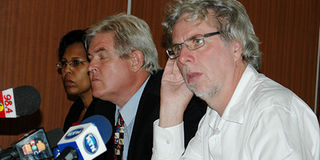Experts: Save children from Aids

Unicef senior adviser on HIV and Aids David Anwick listens to queries during a press conference in Nairobi on Monday. Photo/FAITH NJUGUNA
What you need to know:
- States asked to ensure HIV-positive women deliver in hospitals for babies to be treated
Health experts have urged Kenya and eight other countries to curb the spread of HIV among infants by encouraging women to deliver in hospitals.
Kenya Treatment Access Movement coordinator James Kamau on Monday said pregnant women who are HIV-positive should be encouraged to deliver in hospitals and get treatment.
“This will ensure that babies born to HIV-positive pregnant women will access treatment to prevent them from being infected by the disease,” said Mr Kamau at a press conference in Nairobi.
Newly infected
According to a recent study, an estimated 420,000 children were newly infected by HIV, 90 per cent of them in sub-Saharan Africa. Without treatment, half of them will die before their second birthday.
In Kenya, out of the 1.4 million babies born annually, 57,000 require anti-retroviral (ARV) treatment, while only 25,000 children are currently accessing the life-prolonging drugs.
Of the 1.4 women who become pregnant annually, 44 per cent of them deliver in their homes and those infected are unable to access ARV treatment.
Unicef senior adviser on HIV and Aids (East and Central Africa region) David Alnwick called for urgent action to expand and strengthen existing prevention of mother-to-child transmission services for pregnant women, and boost treatment of infected mothers and children.
“In Kenya and the other eight countries, we must reach 80 per cent of all pregnant women, mothers and their children with services and double the number of infected children on ARV treatment if we are to succeed in halting the spread of the virus,” Mr Alnwick said in a statement.
According to data released by the experts, 1.5 million new HIV infections occurred in Kenya and other sub-Saharan countries.




